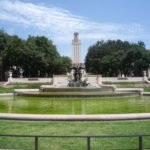Why Is a Liberal Arts Education at Bryn Mawr Important?
This article was written based on the information and opinions presented by Katarina Karris-Flores, an admissions officer at Bryn Mawr College, in a CollegeVine livestream. You can watch the full livestream for more info.
What’s Covered
At Bryn Mawr College, students take a great deal of pride in learning. The liberal arts tradition emphasizes challenging prior conceptions and teaching young people how to think for themselves. In this article, you’ll learn how that looks at Bryn Mawr and how students learn both on and off campus.
Curiosity and Flexibility
Bryn Mawr is a liberal arts college, and its curriculum encourages curiosity of thought, experience, and flexibility. The students value intellectual engagement, and the education that they get feeds into this. They’re taught how to think, not what to think.
This type of teaching can lead students to a variety of professional outcomes. The most popular industry that students enter after graduating is business. Although Bryn Mawr doesn’t have a business major, students are taught to pursue whatever they want in the future; it doesn’t have to pertain to their specific major.
At Bryn Mawr, students are encouraged to diversify their experiences. They’re also introduced to the concept of flexibility in academics through the Approaches to Inquiry, which are the academic requirements that everybody has to fulfill. New students may think that this means they have to take a class like English 101, Math 103, or something similar. But that’s not the case.
Instead, all students need to take classes that fall under different disciplines or schools of thought. A student who isn’t majoring in a STEM (science, technology, engineering, and mathematics) subject still needs to meet the scientific investigation requirement. This doesn’t have to be a strong STEM course, such as chemistry—you could take anthropology, for example. Bryn Mawr just wants to push for curiosity about different topics and intellectual exploration.
Everyone also needs to take the Emily Balch Seminar, a first-year writing course that prepares you for college-level writing. There are around 40 different topics that this seminar could cover. The classes are small and students frequently engage with their instructors. They’re required to meet one-on-one with these seminar instructors, which helps them acclimate to college life and the liberal arts environment.
Connections to Other Colleges
Quaker Consortium
The Quaker Consortium enables Bryn Mawr students to take classes at Haverford College, Swarthmore College, and the University of Pennsylvania (UPenn). Bryn Mawr has combined degree programs with UPenn, so students can earn undergraduate and graduate degrees in a shorter amount of time. Examples include 4-plus-1 programs, where students can earn a master’s in engineering or a master’s in education along with a teaching certification.
A 3-plus-2 program enables students to spend three years at Bryn Mawr and two at UPenn, where they’ll earn a master’s in city and regional planning. There are more options than these, and many students make their Bryn Mawr experience as big or small as they want by venturing off campus and engaging with other colleges.
You’re not required to participate in the Quaker Consortium, and there’s no additional cost to it. But it’s a seamless addition to the school, and many students love the opportunity to take classes that aren’t in their immediate course catalog or to venture off to another campus for the day.
Studying Abroad
Many students study abroad for a semester or an entire year. Your financial aid will transfer over during the academic school year, though not during the summer. Students can participate in about 90 different preapproved study abroad programs.
Bryn Mawr also offers a unique 360 Program, which helps students actualize their learning beyond the classroom through multidisciplinary activities, and there’s often a travel component. This sometimes involves traveling to foreign countries, although it can also entail visiting nearby cities. If students want a longer immersive experience in a different country, they can participate in a typical study abroad program.
Interdisciplinary Learning
The 360 Course Clusters highlight the interdisciplinary nature of a liberal arts education. They involve a cluster of three different classes that you can take during a semester. These all highlight a specific theme, and students often have to travel far off campus.
In one 360, students took on migration and borderlands. They traveled to the United States-Mexico border in Arizona and Mexico because they were focusing on Latin American migration to the U.S. and the border wall between the two nations. Students took a Spanish class and a sociology class that was about migration and borderlands. Travel and the program requirements are funded entirely by Bryn Mawr, so you only need to bring money for souvenirs.
During this particular 360, the travel to the border was canceled because of the COVID-19 pandemic, but students still managed to engage with migrant communities in Philadelphia and New York City. Philadelphia plays a large role in the Bryn Mawr student experience in general because the campus is only a 20-minute train ride away from the city.
Students will often go to Philadelphia to participate in social justice work, volunteer work, fun activities, or career and professional development. The Tri-Co Program is a semester-long program that enables students to participate in curricular and co-curricular activities in the city. You can take classes at Bryn Mawr, Haverford, and Swarthmore, all while engaging in the diversity, complexity, innovations, and systems of the city. This type of critical analysis and on-the-ground work perfectly highlights the nature of a liberal arts education.


